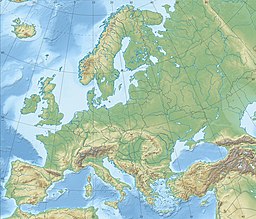Lake Lemuria
This article has multiple issues. Please help improve it or discuss these issues on the talk page. (Learn how and when to remove these template messages)
|
| Lemuria | |
|---|---|
| Лемурійське озеро (Ukrainian) | |
 Lake Lemuria near Syvash Bay. | |
| Location | Kherson Oblast |
| Coordinates | 46°14′29″N 33°44′10″E / 46.24139°N 33.73611°E |
| Type | lake |
| Basin countries | Ukraine |
| References | [1] |
 | |
Lake Lemuria (Ukrainian: Лемурійське озеро, romanized: Lemuriiske ozero), also known as Pink Lake, is a small lake in the western part of Syvash Bay in the Kherson region of Ukraine.[2] It is located near the villages of Hryhorivka and Novovolodymyrivka, Lemuria lake has pink water due to the action of an algae which produces large amounts of beta-carotene. Lake Lemuria is a healing resort of international importance.[3]
The salinity of the lake water reaches 270 – 300 grams of salt per liter of water.[3]
History[edit]
The origins of the lake are disputed. According to one theory, on 26 August 1969, a Soviet bomber crashed on the shores of Syvash. Rescuers allegedly breached salty aquifers while digging to a depth of 18 meters to collect the remains of the bomber.[4] The lake was later formed when underground water filled the excavation. Residents of the surrounding villages named the lake "Yama" and often went for a swim for fun. After some time, stories about the healing properties of the salt water of the lake began to spread. This allowed starting the development of green tourism in this region.[5] Supporters of Helena Blavatsky's esoteric ideas named the lake, as a reference to the mythical continent Lemuria.[6]
Color[edit]
The pink color of the reservoir is due to the action of unicellular algae Dunaliella saline, which under the action of the sun produce beta-carotene. The hotter the summer, the more water evaporates from the lake and the brine gets a more saturated color. While retreating, the water leaves a large amount of salt crystals on the shore. In places, salt crystals get lost, forming "stalagmites". The white shore and the pink lake give this part of Kherson region a very distinctive appearance.[7]
Application[edit]
The mud of this lake was certified[by whom?] in 2005 and approved for use as a therapeutic and cosmetic product. The mud of the lake is included in the program of insurance medicine in Germany.[3]
References[edit]
- ^ Way: Лемурійське озеро (513616679) OpenStreetMap
- ^ Western part of Sivash Wikimapia
- ^ a b c "Туристичні перлини Херсонщини. Частина 2 / Новое Время". 5 July 2018. Archived from the original on 5 July 2018. Retrieved 19 January 2021.
- ^ Автор. "Як Яма стала Лемурійським озером або Чому ціни на нерухомість у Присиваської ОТГ зросли у 6 разів за пів року. Репортаж". decentralization.gov.ua. Retrieved 19 January 2021.
- ^ "Лемурійське озеро: незвичайна історія популярності". www.ukrinform.ua (in Ukrainian). Retrieved 19 January 2021.
- ^ "Лемурийское озеро — уникальное географическое образование на Херс". Последние новости - Kherson.life (in Russian). 9 March 2019. Retrieved 19 January 2021.
- ^ "Мертвое Розовое озеро Херсонщины – путь к исцелению | Портал oktv.ua". oktv.ua. Retrieved 19 January 2021.



